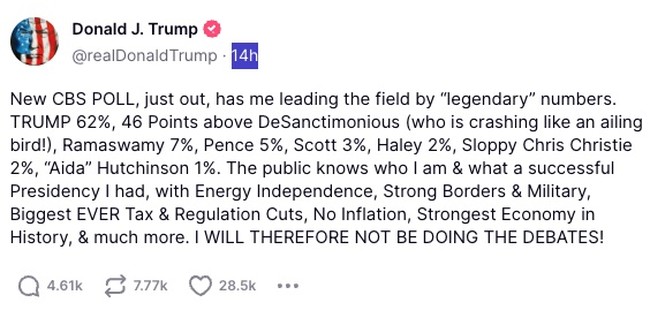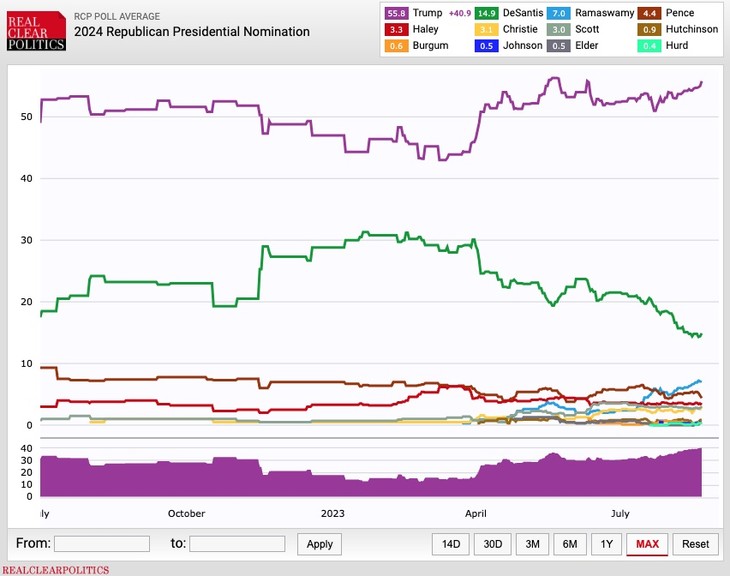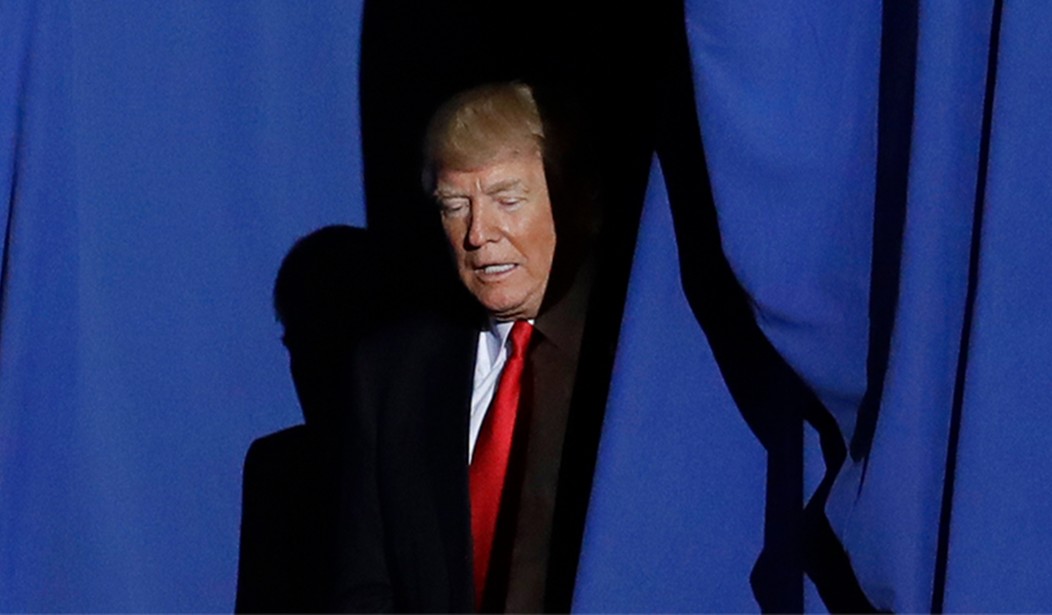Everyone had assumed that Donald Trump wouldn’t show up in Milwaukee next week for the first Republican presidential debate. The former president had heaped scorn on Fox News, which will broadcast the event, and complained that the GOP shouldn’t even have a primary at all this cycle. Besides, his planned arraignment in Georgia at the same time provided a scheduling excuse, if Trump chose to use it, as well as an opportunity to bolster his argument for a coronation.
Late yesterday, however, Trump announced that he would “NOT BE DOING THE DEBATES,” plural:

Count Chris Christie among the unimpressed:
Trump’s decision to avoid the primary debates increases pressure on his GOP rivals to alter their campaign strategies. Former New Jersey Governor Chris Christie, in particular, has made targeting Trump a centerpiece of his White House bid and had relished the prospect of debating him.
“He’s a coward,” Christie told reporters in Atlanta on Saturday, as it appeared increasingly likely that Trump wouldn’t appear. “Do you not owe it to the voters to stand up there and allow them to compare you to the rest of the people running?”
Apparently not. And to be accurate, Trump’s calculations always focus on what’s best for him, not “the voters” in the sense Christie means. To be fair, Trump probably believes that what’s best for him is what’s best for the voters, and that means it’s better not to expose himself in debates.
Trump’s correct in a ruthlessly utilitarian sense, too. Voters do know him, and know his record — his entire record, a point to which we’ll return. Debates won’t matter as much when your saturation level is already at 100%. Right now, Trump dominates the national-level primary polling too. It might not be at the level that CBS’ poll suggests, but it’s no illusion either, as the RCP aggregate average shows:

That doesn’t mean there’s no risk, either. In recent days, Trump has demanded loyalty from fellow Republicans without offering much of it himself. One of the sticking points for Trump, although clearly not the main issue, was the loyalty pledge that the RNC ginned up as a debate qualifier, at least in part for Trump’s benefit. Trump still refuses to comply with it:
While Trump has taken umbrage with the idea of sharing a stage with unfriendly candidates polling in the single digits, he has also said he wouldn’t sign a pledge from the RNC that is a requirement to qualify for the debates. The “Beat Biden” pledge instructs candidates to respect the Republican nominee and not run as a third party candidate.
This certainly lets the others off the hook if Trump wins the nomination. I doubt that any of those who plan on having a political career in the GOP would outright oppose Trump in that instance, but they can now sit on their hands and keep Trump’s baggage from attaching itself to them. A few of them would still enthusiastically back Trump, but the others will likely feel a sense of relief at the reciprocity this offers.
And, like the question of the debates, it settles another question. Trump doesn’t have any use for the Republican Party or Republicans beyond their ruthless-utilitarian value. He demands unidirectional loyalty with no reciprocity at all. And if anyone dares to challenge that hegemony, Trump will do his utter best to destroy Republicans and the GOP unless he gets his way.
But let’s get back to the voters. As Trump declares in his Truth Social post, “the public knows who I am,” and … that’s not a good thing. RCP also aggregates favorability ratings, and Trump’s current average from the same polls is 38.5/56.8, with a -18.3 spread. That’s worse than Joe Biden (40.0/54.7, -14.7) and even worse than Kamala Harris (37.1/53.0, -15.9). Trump may be one of the most unpopular figures to run for president if he wins the nomination, and if it’s a rematch against Joe Biden, that unpopularity will hit hardest in battleground states.
The debates would give Trump a chance to change that by speaking to audiences that otherwise would have tuned him out. Trump wants to keep campaigning via rallies, which were one key to his success in 2015, but all that does is keep Trump in a MAGA bubble. He might be able to win a GOP primary by plurality in a 10-way contest with that strategy, but he will lose a chance to win back disaffected Republicans in the process.
And when it comes to the general electorate, Trump has already lost two elections in a row. He lost the 2020 election by refusing to moderate the chaos during the pandemic, and then his recruited Senate candidates and their focus on “stop the steal” lost the GOP an opportunity to take back control of the Senate. If we count the special Senate elections in Georgia after the 2020 elections, Trump lost three in a row. To win a general election, Trump has to find ways to expand his appeal, not shrink the bubble around it.
That’s what Trump is doing with this declaration. He’s attempting to shrink-wrap himself as the nominee. He’s betting that summer polling for a winter primary is entirely dispositive, which is a serious miscalculation, while ignoring the implication of the broader polling picture. Republican voters should consider the implications of that very carefully in the days and weeks ahead.








Join the conversation as a VIP Member